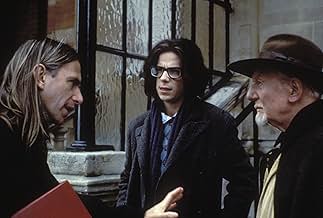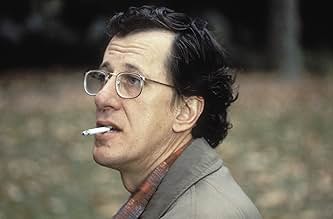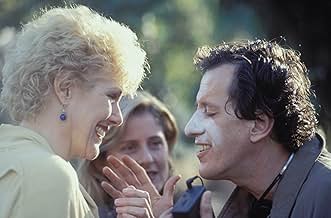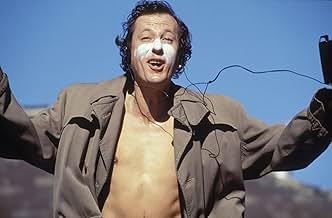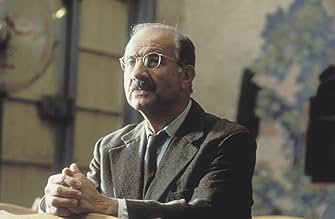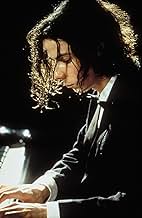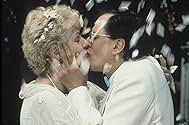CALIFICACIÓN DE IMDb
7.6/10
58 k
TU CALIFICACIÓN
El pianista David Helfgott, impulsado por su padre y maestros, sufre una crisis. Años después, vuelve a tocar el piano entre los vítores de la gente y de la crítica.El pianista David Helfgott, impulsado por su padre y maestros, sufre una crisis. Años después, vuelve a tocar el piano entre los vítores de la gente y de la crítica.El pianista David Helfgott, impulsado por su padre y maestros, sufre una crisis. Años después, vuelve a tocar el piano entre los vítores de la gente y de la crítica.
- Dirección
- Guionistas
- Elenco
- Ganó 1 premio Óscar
- 46 premios ganados y 52 nominaciones en total
- Dirección
- Guionistas
- Todo el elenco y el equipo
- Producción, taquilla y más en IMDbPro
Opiniones destacadas
I don't now why but when I first viewed this a few years back I did not care for it, but after watching it again I was very impressed. Maybe because I have grown more of an appreciation for classical music in that timeframe. I really don't understand how I could have missed the outstanding portrayal of the nuturing/stultifying father-son relationship, or the moving way that David can only express himself via the piano (notice how he speaks in virtually only apothems). This is a very great film.
This movie is definitely in my top five favorite movies of all time. It is unbelievably brilliant. Geoffrey Rush, dare I say, is perhaps the greatest actor of modern times. His performance alone is worth watching, let alone the outstanding supporting cast! Definitely not in typical Hollywood fashion, the movie is a truly great indie film. A must see for music lovers and indie film lovers alike.
When I originally saw this film in the mid-90's, I was absolutely devastated throughout the first forty-five minutes. So much so, I was pretty much uncontrollably weeping, much to the chagrin of the friend I went with. Time has softened the film a lot for me, but it still remains a powerful, tender and somewhat inspirational film about a piano prodigy who has led a pretty tragic life. Geoffrey Rush is unbelievable as the piano prodigy David Helfgott, and although the film is kind of sewn up a little quickly with the Vanessa Redgrave subplot (what about Helfgott made her so in love with him in a short period of time as to want to marry him?) it is a very well done film that I highly recommend to just about anyone, but especially musicians and music lovers.
--Shelly
--Shelly
David is a stuttering, rambling man having suffer a complete breakdown as a young man. However when he was a child his skills on the piano were unmatched. Driven by his father, opportunities open up in front of him to go abroad to learn, but his father denies him the chance. He leaves for London where he drives himself to the point of exhaustion before coming back home to find his father has disowned him.
It took me years to finally watch this film. I was still in Northern Ireland when it came out in the cinema and such films were not permitted to cross our borders, lest they keep the latest action movies from our 1 or 2 screen cinemas! So away from the hype and the Oscar hoopla I sat to watch this film and found myself easily taken in by it. The story is the true story of David Helfgott who was a boy genius before his breakdown. The film starts with him as an adult then jumps back to see him as a child. This approach works well to allow us to see the `end result' as it were, before we see what would be considered the causation factors. These factors are a little heart breaking to watch but they are very well delivered. As an adult, David is comic, warming and tragic. The pain in his life is brought out very well.
A great deal of the praise for this must lie with the wonderful cast. Rush got his Oscar of course and I'll leave it to the users on the message boards to argue over whether or not you can be the lead actor with screen time of less than half the film! He is great, walking a difficult line with a `disabled' character but managing not to just make it a caricature at any point. David as a child is very well played by Rafalowicz and does more of the development work than Rush and hence gets less credit than he deserves for making us care for the adult David. Mueller-Stahl is as good as he can be and gives a great performance, the only downside being that he doesn't age a single day between the adult and child sections of the story - surely some makeup could have been used?
Overall this is a very enjoyable human story that is driven by several really strong performances in key roles. The story keeps it's tone light but yet still manages to be dramatic and, in some scenes far too touching to avoid being slightly moved. The music is beautiful when it is called on to be and dramatic at other times - the director does very well to make the intense music translate into intense scenes in the film. Overall a simple story of a man but one that is interesting and a lot more moving that I expected it to be.
It took me years to finally watch this film. I was still in Northern Ireland when it came out in the cinema and such films were not permitted to cross our borders, lest they keep the latest action movies from our 1 or 2 screen cinemas! So away from the hype and the Oscar hoopla I sat to watch this film and found myself easily taken in by it. The story is the true story of David Helfgott who was a boy genius before his breakdown. The film starts with him as an adult then jumps back to see him as a child. This approach works well to allow us to see the `end result' as it were, before we see what would be considered the causation factors. These factors are a little heart breaking to watch but they are very well delivered. As an adult, David is comic, warming and tragic. The pain in his life is brought out very well.
A great deal of the praise for this must lie with the wonderful cast. Rush got his Oscar of course and I'll leave it to the users on the message boards to argue over whether or not you can be the lead actor with screen time of less than half the film! He is great, walking a difficult line with a `disabled' character but managing not to just make it a caricature at any point. David as a child is very well played by Rafalowicz and does more of the development work than Rush and hence gets less credit than he deserves for making us care for the adult David. Mueller-Stahl is as good as he can be and gives a great performance, the only downside being that he doesn't age a single day between the adult and child sections of the story - surely some makeup could have been used?
Overall this is a very enjoyable human story that is driven by several really strong performances in key roles. The story keeps it's tone light but yet still manages to be dramatic and, in some scenes far too touching to avoid being slightly moved. The music is beautiful when it is called on to be and dramatic at other times - the director does very well to make the intense music translate into intense scenes in the film. Overall a simple story of a man but one that is interesting and a lot more moving that I expected it to be.
"Shine" purports to tell the story of David Helfgott (Geoffrey Rush, who plays the adult Helfgott), a promising pianist who overcame mental illness, with the help of his wife, and returned to performing.
The 1996 film is actually a fictionalized version of Helfgott's life - but even had it not been based on a true story, it remains a powerful, intriguing film.
David is the child of German émigrés who now live in Australia. His father Peter (Armin Mueller-Stahl) is a self-taught pianist who teaches David his same love of piano and classical music. There is love there, but as portrayed in the movie, Peter is a rigid man who gives his son mixed signals. He drives his son to succeed as a pianist, teaching him that winning is everything, and yet, when David has opportunities that would take him away from the family, Peter won't permit it. The reason for this is that Peter and his wife lost relatives in the Holocaust. Peter is also given to physical abuse toward David when he loses his temper.
David finally gets away from him and attends the Royal Conservatory in London, where, with the help of his teacher (John Gielgud), he wins an important competition but then suffers a severe nervous breakdown. The rest of the movie deals with the road back, which leads him home to Australia and to his wife, Gillian. Gillian is actually his second wife, though the first marriage isn't mentioned in the film.
The dominant performances belong to Rush and Mueller-Stahl. Rush does a brilliant job of showing us the likable but stuttering David who speaks rapidly and repetitively, expressing himself through music. Mueller-Stahl as the tortured Peter is fabulous, a man who is both monstrous and pitiable. In a small role, John Gielgud of course makes a fine impression as an elderly teacher, a wonderful pianist himself, who believes in David's talent.
The best scene is David playing Rachmaninoff's Piano Concerto #3 - Helfgott's own recording of the piece is used - and the aftermath. What I missed in this film is music - there was a lot of talk about David's promise, but until the Rachmaninoff not much playing.
Helfgott's work today has been deeply criticized for being - well, lousy. A review in The New York Times of one of his concerts is horrible. The reviewer, however, mentions that Helfgott occasionally showed vestiges of excellent technique. I think it's safe to assume that his playing nowadays is more erratic than it was in his earlier years. There are several examples of Helfgott's playing in the movie: "La Campanella," "Hungarian Rhapsody No 2 In C Sharp Minor," "Flight of the Bumble Bee," Rachmaninoff's "Prelude In C Sharp Minor, Opus 3, No. 2," the previously mentioned Rachmaninoff 3, and Liszt's "Sospiro," and it is all quite stunning. Rush does the fingerings himself. One of the comments also claims that Helfgott's wife has Helfgott perform on no medication so that he'll seem crazy - it's common for performers on medication for mental problems to have to cycle off of it before performing. I don't think the commenter has any idea what Helfgot is like on his medication - certainly in the film, he acts strangely.
"Shine" is highly recommended for its fantastic performances, beautiful music, and its inspiring story.
The 1996 film is actually a fictionalized version of Helfgott's life - but even had it not been based on a true story, it remains a powerful, intriguing film.
David is the child of German émigrés who now live in Australia. His father Peter (Armin Mueller-Stahl) is a self-taught pianist who teaches David his same love of piano and classical music. There is love there, but as portrayed in the movie, Peter is a rigid man who gives his son mixed signals. He drives his son to succeed as a pianist, teaching him that winning is everything, and yet, when David has opportunities that would take him away from the family, Peter won't permit it. The reason for this is that Peter and his wife lost relatives in the Holocaust. Peter is also given to physical abuse toward David when he loses his temper.
David finally gets away from him and attends the Royal Conservatory in London, where, with the help of his teacher (John Gielgud), he wins an important competition but then suffers a severe nervous breakdown. The rest of the movie deals with the road back, which leads him home to Australia and to his wife, Gillian. Gillian is actually his second wife, though the first marriage isn't mentioned in the film.
The dominant performances belong to Rush and Mueller-Stahl. Rush does a brilliant job of showing us the likable but stuttering David who speaks rapidly and repetitively, expressing himself through music. Mueller-Stahl as the tortured Peter is fabulous, a man who is both monstrous and pitiable. In a small role, John Gielgud of course makes a fine impression as an elderly teacher, a wonderful pianist himself, who believes in David's talent.
The best scene is David playing Rachmaninoff's Piano Concerto #3 - Helfgott's own recording of the piece is used - and the aftermath. What I missed in this film is music - there was a lot of talk about David's promise, but until the Rachmaninoff not much playing.
Helfgott's work today has been deeply criticized for being - well, lousy. A review in The New York Times of one of his concerts is horrible. The reviewer, however, mentions that Helfgott occasionally showed vestiges of excellent technique. I think it's safe to assume that his playing nowadays is more erratic than it was in his earlier years. There are several examples of Helfgott's playing in the movie: "La Campanella," "Hungarian Rhapsody No 2 In C Sharp Minor," "Flight of the Bumble Bee," Rachmaninoff's "Prelude In C Sharp Minor, Opus 3, No. 2," the previously mentioned Rachmaninoff 3, and Liszt's "Sospiro," and it is all quite stunning. Rush does the fingerings himself. One of the comments also claims that Helfgott's wife has Helfgott perform on no medication so that he'll seem crazy - it's common for performers on medication for mental problems to have to cycle off of it before performing. I don't think the commenter has any idea what Helfgot is like on his medication - certainly in the film, he acts strangely.
"Shine" is highly recommended for its fantastic performances, beautiful music, and its inspiring story.
¿Sabías que…?
- TriviaGeoffrey Rush had once learned the piano up until aged fourteen. He took up piano lessons again thirty years later for this movie and also acted as his own hand double and body double.
- ErroresThe character shows all signs of schizophrenia; not bipolar disorder (formerly known as "manic-depressive disorder"), as is claimed in the film. The real David Helfgott likewise displays many symptoms of schizophrenia and none of bipolar disorder.
- Citas
Cecil Parkes: You must play as if there's no tomorrow.
- Créditos curiososHimself: hand double for Geoffrey Rush
- Bandas sonorasWith A Girl Like You
Written by Reg Presley
© 1966 Dick James Music Limited
Performed by The Troggs
© 1966 Mercury Ltd. London
Selecciones populares
Inicia sesión para calificar y agrega a la lista de videos para obtener recomendaciones personalizadas
- How long is Shine?Con tecnología de Alexa
Detalles
- Fecha de lanzamiento
- País de origen
- Sitios oficiales
- Idiomas
- También se conoce como
- Shine
- Locaciones de filmación
- Productoras
- Ver más créditos de la compañía en IMDbPro
Taquilla
- Presupuesto
- USD 5,500,000 (estimado)
- Total en EE. UU. y Canadá
- USD 35,892,330
- Fin de semana de estreno en EE. UU. y Canadá
- USD 162,179
- 24 nov 1996
- Total a nivel mundial
- USD 35,999,121
- Tiempo de ejecución1 hora 45 minutos
- Color
- Mezcla de sonido
- Relación de aspecto
- 1.85 : 1
Contribuir a esta página
Sugiere una edición o agrega el contenido que falta

Principales brechas de datos
By what name was Claroscuro (1996) officially released in India in Hindi?
Responda



